The Nexus 6 Review
by Brandon Chester on November 12, 2014 1:00 PM ESTCamera
The camera has always been something of a pain point for Nexus devices. Since the Galaxy Nexus launched we've seen camera sensors that always seemed to be one step behind the competition. The price point that Google had aimed for with their Nexus phones certainly contributed to this, and software issues like upscaled, stretched, or cropped previews did not help the situation either. With the Nexus 6 being priced as a premium device, one would hope that it sports an equally premium camera, and indeed it does. The Nexus 6 uses Sony's IMX214 with an F/2.0 aperture and OIS for the rear camera, a sensor we've seen in HTC's Butterfly 2, and the OnePlus One just to name a couple of examples. I'm happy with Google's decision to continue using 4:3 camera sensors which tend to make framing scenes easier than 16:9 sensors in my experience.
Before looking at photos taken with the Nexus 6, it's important to look at how fast it is able to focus and capture photos. After all, if your phone takes too long to focus, the moment you wanted to photograph may already be over by the time you can take the shot.
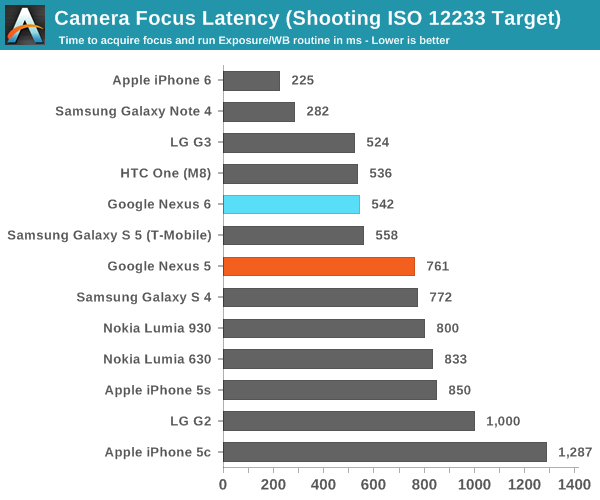
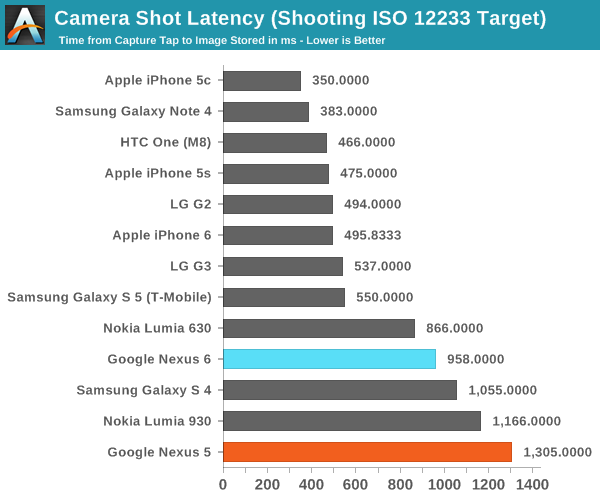
The Nexus 6 has a focus latency which is competitive with some of the flagship devices released this year like the LG G3 and HTC One (M8), but it's not in the same class as the recently released iPhone 6 and Galaxy Note 4. The shot latency is also surprisingly long, and I repeated the test multiple times to confirm. The Nexus 5 also had a long capture time, and so it may be that this is a result of issues in Google's Camera application rather than anything relating to the device's camera itself.
The Nexus 6 seems to vary its ISO between 40 and 1200, while the Nexus 5 typically varied between 100 and 1600 with some extremely high values as high as 3000 in certain circumstances. I was only able to get exposure time up to 1/12th of a second which is somewhat fast for a device with OIS. The Nexus 5 wasn't shy about going up to 1/6th of a second if it needed to.
The camera software is also an important aspect of mobile photography. Google's Camera application is actually quite good for a relatively automatic photo experience. I do think that Google could expose more of the controls like switching between camera modes and toggling the flash as constantly visible controls without reducing the amount of space for the preview significantly. Something I noticed while using the Nexus 6 is that the colors of the preview in the viewfinder were quite saturated. This is, of course, due to the display calibration, which unfortunately means that the viewfinder is not very helpful in determining how the photo is actually going to look. The preview framerate also tends to run below 30fps which has been the case for a long time now, but I hope that pointing it out will eventually get it improved.
Still Image Performance
These next tests use photographs of an outdoor area at various times to guage the performance of a smartphone's camera relative to other smartphones, as well as a controlled test scene inside a well lit area. I am unfortunately limited by the number of devices I have on hand, which at the moment includes the Nexus 6, iPhone 6, Nexus 5, and HTC One (M7).
Before getting into the actual tests I wanted to mention something about smartphone camera white balance that won't be apparent based on the images alone. Based on how I actually saw the scene as I was taking the photos, I can confidently say that the Nexus 6 consistently had a far more accurate white balance than any of the other devices I tested. This can actually have a huge impact on the overall appearance of the image, and it can be easy to overlook when doing these sorts of comparisons. For example, the iPhone 6 photo in the evening test has a shift toward blue that makes it appear to be much darker out than it actually was, while the Nexus 6 more accurately reflects how the scene looked at the time. With that out of the way, lets begin with the daytime test.
In this first test the Nexus 6 performs very well. I would say it produced the best overall image of the four devices I tested. The higher resolution sensor allows for greater sharpness and detail in areas like the branches of the trees, and the bars of the black metal gate on the left side are only captured with sufficient detail by the Nexus 6. However, I did notice an issue with the output from the Nexus 6, which is a concerning amount of blur in the section of branches that is to the right of the centre of the image, but not at the very right edge of the frame. I took several photos and even repeated the test on a different day, but the issue persisted.
In this next test we have the same scene at a later time of day with less natural lighting. The performance of the iPhone 6 approaches the Nexus 6 due to its larger sensor pixels giving it an edge in low light circumstances, but the Nexus 6 still maintains an overall higher level of detail and sharpness, particularly on the trees.
With the outdoor scene in low light we can see that all of our devices start to struggle. The Nexus 6 ends up sharper and less noisy than the Nexus 5 by driving a much lower ISO of 1200 instead of 2500. However, the brick building on the right shows that although the OIS on the Nexus 6 allows for a longer shutter time, Apple's iPhone 6 is able use a lower ISO and better preserves detail with finer grained noise throughout the image in general.
The last test we perform is a highly controlled test scene with generous lighting and different textures to see how well the Nexus 6 is able to capture detail in something of a best case scenario. In this case the Nexus 6 once again provided the best sharpness and detail preservation of all the devices I tested. The white balance is shifted toward pink which is an odd exception from the performance in the other tests.
I'm very happy with the improvements Google has made to their camera on the Nexus 6. I no longer feel like Nexus devices will always be a generation behind the competition when it comes to camera quality. Google and Motorola should also congratulate themselves on their white balance algorithm which helped the Nexus 6 to take photos that better reflected how the scenes actually looked in real life. I hope Google will continue to improve their camera software to make the user interface less menu driven, and to improve capture times for photos which is the one area that the Nexus 6 really falls behind its competition.


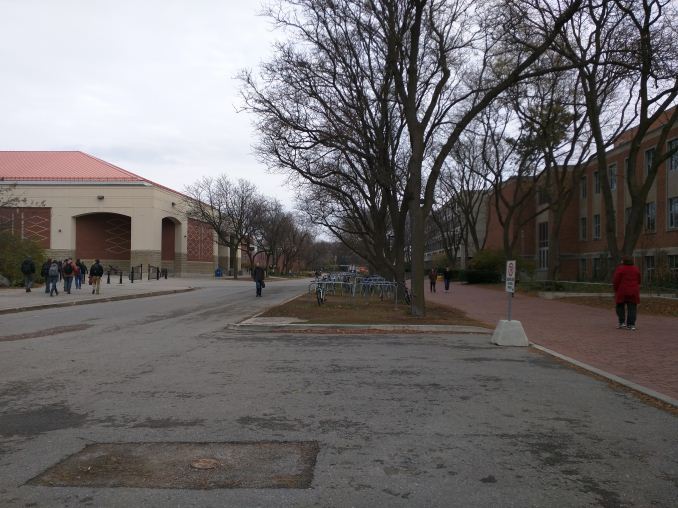




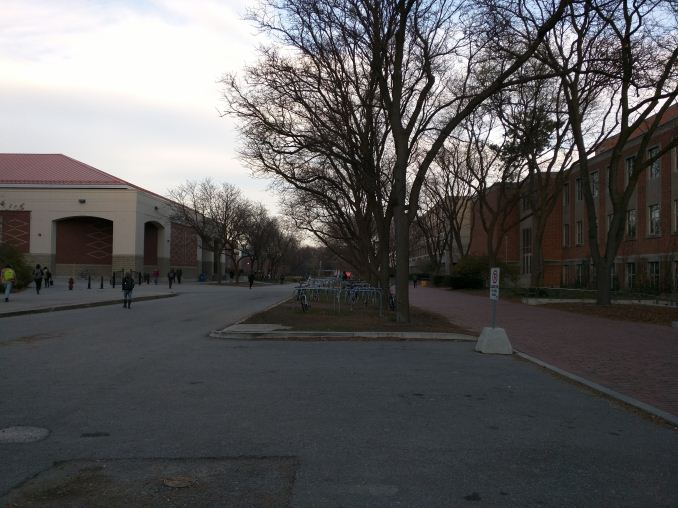




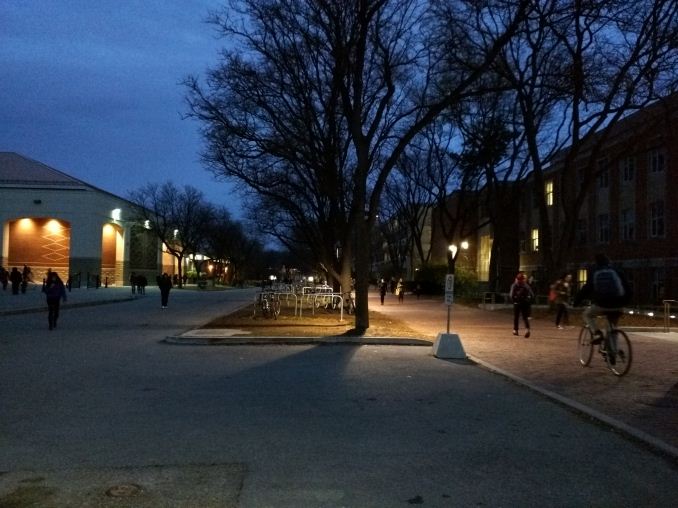




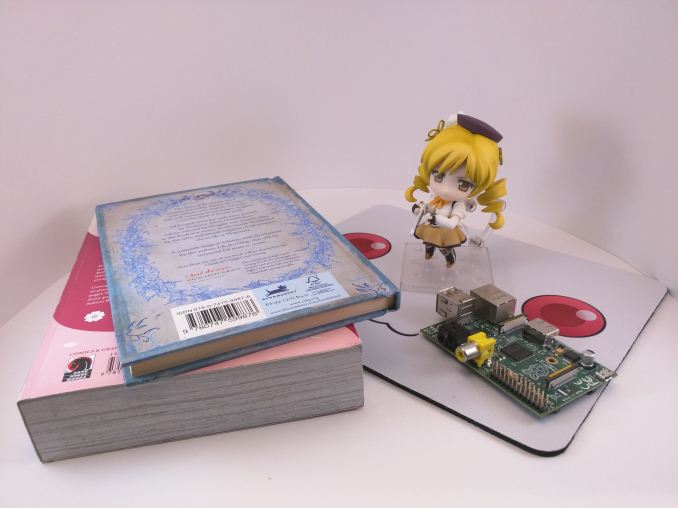












136 Comments
View All Comments
synaesthetic - Thursday, November 27, 2014 - link
I'm still deeply in love with my Nexus 4 despite it being two years old, but the 16GB storage is starting to chafe a bit. I'll be looking at trading up, selling the N4 to fund a 32GB Nexus 5. It's a better phone in practically every way and I really think LG did a fantastic job on both the N4 and the N5.The N6 is just... really, it's confusing. I don't get it. How could they fuck this up?
EleGenius - Tuesday, January 27, 2015 - link
I felt the same way about my Nexus 4 but after water damage I purchased the Nexus 6 as the N5 was no longer available from the Play Store. I rooted the N6 for the notification light and Titanium Backup, turned off ambient display, installed brightness pro (quick manual control from any screen with one touch), and I'm loving the device. I get about two days worth of battery without playing games. I'll admit It's taken me about a week to get use to it but now it's easily my right hand and going back to the N4 in a way seems silly.My wifi connections and cellular signal with T-Mobile has been solid. I’ve noticed only one issue and that’s within the first 10 seconds after the phone has restarted there's a slight delay (I think it's the encryption being initialized) but after that I think the update 5.0.1 has resolved the encryption speed as the phone is as fast if not quicker then I am.
If you're happy with your N4, keep it it’s a good device. My N4 ran Loliopop very well except for the random daily reboots which I haven’t experienced on the N6. If you upgrade to the N6, I think you'll find it's a great device too even if it first comes off as confusing. My only caveat would be smaller hands and if you wear tight pants with small pockets. I'm 6'3" - 6'4" with above average fingers and can use this device one handed. I can see where people with smaller hands may run into handling issues. This device fits very well in my front pockets too. A little snug when wearing jeans but still completely manageable.
I was bothered by the N6 at first but now after owning it it’s easily my favorite Nexus to date. I use my N6 more then my N7 and with it rooted for the notification light (Light Flow) it’s like having by N4 back but better, much better. Don’t throw the N6 out yet, it’s turning out to be a solid device that’s now become my digital right hand. If you give it a chance I think you may find the same to be true.
jimv1983 - Thursday, November 13, 2014 - link
How anyone could ever go from a Nexus device with stock Android to a Samsung phone running that TouchWiz garbage amazes me.grayson_carr - Thursday, November 13, 2014 - link
Same. Samsung owners are always going around talking about how fast their phones are... no lag, no slowdowns, perfectly smooth, etc, but every time I go into a store to play with a new Samsung phone on launch day, it feels slow as hell, dropping frames left and right, compared to my Nexus devices. The GS5 and Note 4 are no exception. Maybe Samsung phones feel fast compared to older phones, especially older Samsung phones, and maybe that's why so many people think they are fast, but they just don't perform at the same level as modern Nexus, Motorola, and HTC phones. If they did, I would have a Note 4 in my pocket right now, because I love the camera, screen, and build, and I can live with the cluttered and slightly garish software.akdj - Friday, November 14, 2014 - link
Change the launcherThe Note 3 SMOKED the Nexus 5
The Note 4 SMOKES the Nexus 6
And it's NOTHING to do with the 'hardware' as it's essentially the same. That said, something in the software isn't allowing the Nexus 6 to run ANYwhere nearly as quickly, efficiently and smoothly as ANY other Android flagships. Period.
That was the same issue with the Nexus 5 ( that and the shitty camera )
akdj - Friday, November 14, 2014 - link
Wish there was an edit ...Because you're essentially admitting TouchWiz is superior to 'stock' Android. TouchWiz @ release was trash. Through the release of the G3--->& everything but the kitchen sink.
Since then with the S4 & 5, Note 2, 3, & now 4---> Samsung's spent MORE time developing the compelling features of TouchWiz while elimating the 'duff'
The carriers and their bloat ass to the crap. I've owmed them all, and when it comes to 'large phones' or phablets, there's not an equal to the Note 4
theduckofdeath - Friday, November 14, 2014 - link
You'd have to go really far back in history to find trash TouchWiz. TouchWiz had a hardware accelerated UI on the GS2. Yeah, that was with Android 2.x. I agree the TouchWiz Samsung used on the original Galaxy S needed a lot of tweaking, thanks to horrible choices of file systems and really sloppy colour and sound calibration. But since the GS2, I've never felt the need to root a Samsung phone.mlambert890 - Saturday, December 20, 2014 - link
Far back? TouchWiz has noticeable user experience impact ON THE NOTE 4Samsung zealots simply don't notice or are in denial, but anyone objective IMMEDIATELY sees it.
When you go to swipe to the left and your 8 core desktop level phone pauses? That's not normal just FYI. Benchmarks don't tell that tale.
TouchWiz has REAL WORLD performance impact in exchange for zero benefit
Yes you can change launchers, root the phone, install hacked ROMs, and get a PhD in phone. Or you can just avoid Samsung
nafhan - Wednesday, November 12, 2014 - link
Eh, I've gotta' say I feel extremely satisfied with buying a Nexus 5 (yes, 5) last week.grayson_carr - Thursday, November 13, 2014 - link
If Google put a slightly larger battery and the camera from the Nexus 6 in a revamped Nexus 5, I would buy it in a heartbeat. The processor, RAM, and screen are shockingly all still great, even a year in. It's still as fast, if not faster in day to day tasks than the Nexus 6 (and pretty much every other phone), and the sub pixel density of the screen is actually higher than the Nexus 6, not to mention much better brightness and color calibration!